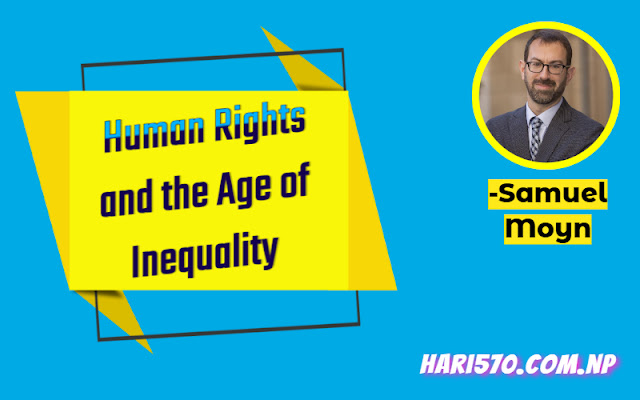
The Essay “Human Rights and the Age of Inequality” by Samuel Moyn Exercise: Questions and Answers Class 12 English
Understanding the text
Answer the following questions.
a. What is the first human rights declaration adopted by the United Nations?
➜ The first human rights declaration adopted by the United Nations is mobilization for economic and social rights.
b. When is Human Rights Day observed?
➜ Human Rights Day is observed on 10th December every year.
c. What is the goal of the Universal Declaration of Human Rights?
➜ The goal of the Universal Declaration of Human Rights is to provide a list of the most basic entitlements or key values like fairness, dignity, equality and respect that humans deserve thanks to being human itself. Furthermore, its aim is to assert the ” foundation of freedom, justice and peace in the in the world.”
d. What are two big stages that involve writing the history of human rights in relation to that of political economy?
➜ The two big stages that involve writing the history of human rights in relation to that of political economy are:
- The heroic age of national welfare after World War II.
- The bitter enemies of the new cold war era in 1948.
e. What are the facts that have been missed in Roosevelt’s call for a “second Bill of Rights”?
➜ The facts that have been missed in Roosevelt’s call for a “second Bill of Rights” are:
- First, it marked a characteristically provincial America’s Late and ginger entry into an already foreordained North Atlantic consensus.
- Second, his highest promise was not a floor of protection for the masses but the end of “special privileges for the few” – a ceiling on inequality.
- Lastly, Roosevelt certainly hoped it would span the globe but it was organized nationally, not internationally.
f. Write the truth expressed in Herodotus’s Histories.
➜ The truth expressed in Herodotus’ Histories is that global socio-economic justice, like local socio-economic justice, would require redistribution under pressure from the rich to the poor by novel forms of legal activism.
g. Why is the Universal Declaration of Human Rights important to you?
➜ The Universal Declaration of Human Rights is important to me as it works in favour of all human beings for their rights, justice, equality, equity by removing partiality, injustice, inequality, discrimination, and so on from society.
Reference to the Context
a. Does the essay give ways on how to stigmatize inequality? Explain.
➜ The essay “Human Rights and the Age of Inequality” don’t give some specific ways on how to stigmatize inequality but it talks about the stigmatization of inequality. Most of all, history suggests that they are the wrong kind of agent; not fearful enough to provoke redistribution. If inequality grows like this, opponents will arise some days. Therefore, it is better to maintain equality and justice in society. By forming new sort of human rights movement for the sake of the common people, social equality and liberation can be justified. Proper supervision and monitoring, support of stakeholders, enacting strict laws, removing partiality and maintain justice and equality etc. are necessary for the humanitarian behalf of the all human beings. Inequality is believed to be as a stigma for the society as it creates tussle and conflicts among the people so proper balance for it is required.
b. Is another human rights movement necessary? Why?
➜ Yes, another human rights movement is necessary as the essayist finds Human Rights is functioning under political suppression constrained in human affairs. He wishes to see another Human rights movement in the coming days due to following reasons:
- People who are in powerful positions found violating the laws.
- Inequality has been contained in human affairs.
- Nepotism and favouritism is still in practice.
- Law is to be given top priority.
- Political and social hegemony is still prevalent in the world.
- Laws and rights are only documented rather it is not in practice.
- There is need of rights and justice for all human beings whether they are rich or poor, belong to upper class or lower class.
Reference beyond the text
a. What are the challenges in maintaining human rights in Nepal?
➜ Human rights are the basic rights and freedoms that belong to everyone. International law, including treaties, contain the provisions which give human rights legal effect.
Human rights was established in the year 2000 as a statutory body under the Human Rights Commission Act 1997 (2053 BS) in Nepal. The interim Constitution of Nepal 2007 (2063 BS) made the NHRC a constitutional body.
The main challenging factors in maintaining human rights in Nepal are as follows:
- Poverty (particularly in rural areas)
- Education disparities
- Gender inequality
- Health issues
- Child rights violations
- Misuse of power
- Nepotism, corruption, bribery, illiteracy and ignorance of people
- Priority for the personal benefits or favour
- Lack of proper mechanism to systematize policies
- Lack of proper strategies to implement the rules of laws etc.
it is very useful for me.thanks for support.
great page for reference